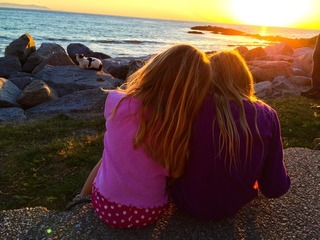Kelly Lovejoy, on the thoughts that help parents to deschool:
What are your passions? HOW did you learn to do those things? In a classroom?
Two of my passions as a child were dogs and horses. Dogs and horses are NOT taught in any grade, middle, or high school *I* know of. But I wanted to learn everything I could about them. My parents gave me dogs and horses. They bought me books and paid for me to take riding lessons and dog obedience classes. They paid for dog and horse shows and equipment. My passion threw me into reading every book I could find (there were no videos back then—nor "Animal Planet").
By twelve I could identify every breed of dog and horse that I had ever seen or read about and tell you how it was developed, where, why, and by whom. I spent every weekend and every afternoon at a dog show/horse show/event/trial or just hanging around the stable or kennel. I asked thousands of questions and "got my hands dirty." Many of my friends were adults with the same passions. Training, breeding, grooming, showing, husbandry—all of these things I learned because I was consumed by them!
But, of course, dogs and horses are NOT school subjects—and are completely unimportant in the school world. What if I had waited for a teacher to come along and say, "Today we are learning all about dog and horses"? Not only would I have waited all my life, the teacher would only have given me a "taste" of the subject!
OH! And you *can't* make a living with dogs and horses—right?
Stage one is often referred to as DEschooling. It's the period of time we need to give ourselves in order to "step away from the box" of school and school-think. Ask yourself why and how you learned your passion: whether it was music, cooking, flying, gardening, or long-distance running. Or even more "academic-like" passions, like Shakespeare, chemistry, World War II, or a foreign language. When you are comfortable with how learning happens by indulging in passions and making connections in your learning, you are quickly heading towards stage two.
—Kelly Lovejoy
from "Stages of Unschooling"
SandraDodd.com/kellylovejoy/stages
photo by Cathy Koetsier



















